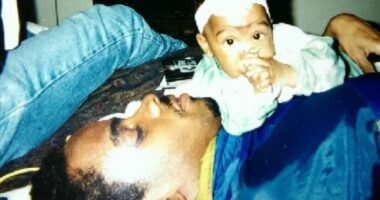Share this @internewscast.com
Ariana Grande recently announced she has tested positive for COVID-19, just as she was wrapping up a hectic promotional tour for “Wicked: For Good.”
The 32-year-old singer and actress shared the news via Instagram Stories on Thursday, posting a still from her recent appearance on The Tonight Show With Jimmy Fallon alongside the caption: ‘moments before Covid.’
This revelation comes on the heels of her decision to forgo interviews at the New York premiere of the film, standing in support of her co-star Cynthia Erivo, who was then dealing with an illness and had temporarily lost her voice.
The promotional tour has been anything but straightforward for Grande. She missed the film’s initial premiere in Brazil, and during the events in Singapore, an unsettling incident occurred when a man breached the red carpet barriers, rushing towards her.
Cynthia Erivo acted quickly, stepping in to protect Grande by pushing the intruder away. The incident left Grande visibly shaken when Johnson Wen stormed the red carpet. In response, an angry Erivo, who portrays Elphaba in the film, took the matter into her own hands, overtaking security to ensure Grande’s safety. Wen has since faced legal consequences, receiving a nine-day jail sentence for his actions.
Erivo swiftly intervened, stepping in to push the individual away from her co-star.

Ariana Grande has revealed she tested positive for COVID amid the tail end of her promotional whirlwind for Wicked: For Good; seen on November 17, 2025
A terrified Grande was struck by Johnson Wen, who stormed the red carpet, leading to an incensed Cynthia, who plays Elphaba, overtaking security and pushing him away. Johnson has since been given nine days jail time for the act.
Erivo and Grande appeared at a special Screen Actors Guild screening in Los Angeles on Saturday, during which the former spoke about how the movie helps make people ‘feel safe’ – before giving a nod to last week’s ordeal.
She said: ‘I mean, f**k, even this last week. Let’s be honest, for f**k’s sakes, we’ve had to really deal with some stuff, and this movie has allowed us to really grow as people, as friends, as sisters, as artists, as actresses.’
Johnson, the online prankster known as Pyjama Man, blew past security at Universal Studios and latched onto Grande, wrapping an arm around her as she struggled to pull away – prior to Cynthia’s lightning speed reactions.
Erivo immediately jumped in, shouting at Wen while throwing herself between him and Grande as security tackled the intruder and dragged him off.
Grande was left visibly shaken on the carpet.
Hours later, Wen uploaded a chilling selfie with manic eyes, pointing at a Grande poster and bragging, ‘I finally met Ariana Grande tonight.’
Due to the positive test, Grande has now been forced to withdraw from a pre-taped joint appearance with Erivo on The Kelly Clarkson Show, with Erivo proceeding solo for the segment.
The pop star will also miss several upcoming Q&A discussions related to the film in the coming days.

The actress, 32, shared the news via Instagram Stories on Thursday, posting a still from her recent appearance on The Tonight Show With Jimmy Fallon alongside the caption: ‘moments before Covid’ (seen on November 18, 2025)

Her diagnosis comes only days after she skipped press interviews at the New York premiere of For Good in a show of solidarity with co-star Cynthia Erivo
This isn’t the first time COVID has disrupted the Wicked experience for the pair.
Both stars previously tested positive at different points during filming of the first movie.
Erivo fell ill just days before shooting the show-stopping number Defying Gravity, while Grande received her diagnosis shortly before filming her musical moment Popular.
In a joint chat with The New York Times last year, Grande and Erivo revealed that they each fell ill with the virus during production on the film involving major numbers.
‘There was one time when I got Covid, there was another time when she got Covid,’ Erivo said, while Grande added: ‘We only got sick once each, but both were before some of the most important works of the whole movie.’
Grande continued: ‘I came to set with a mask on my final days of recovery … no one liked this joke but I loved it so I’ll tell it.
‘We were in the dorm room together and I sang in her ear, “Positive, you’re going to be positive! But I wasn’t positive anymore, don’t worry! I took the test.’

Grande was notably absent from the film’s initial premiere in Brazil , and during the Singapore celebrations, a tense moment unfolded when a man jumped the red carpet barricades and rushed toward her

Erivo and Grande appeared at a special Screen Actors Guild screening in Los Angeles on Saturday, during which the former spoke about how the movie helps make people ‘feel safe’
Erivo said that she perceived that coming down with the virus at that time was a matter of fate.
‘It was literally like, “Sit down, Cynthia, not yet,”‘ Erivo said.
The stars said that the making of the two-part musical film, directed by Jon M. Chu, also faced delays amid the 2023 industry labor strikes.
Erivo said, ‘At first, it felt like an interruption, and then as it went on, it felt like the rest we needed.
‘We’d worked ourselves to the bone. I was really grateful because the next thing that we had to do was Defying Gravity, and it felt like the universe going, “You need your full strength to do this.”‘
Grande said that she and Erivo did not find it hard to get back into character amid the grueling production on the motion picture adaption of the Broadway musical.

Due to the positive test, Grande has now been forced to withdraw from a pre-taped joint appearance with Erivo on The Kelly Clarkson Show, with Erivo proceeding solo for the segment

The Wicked cast also includes Jeff Goldblum, Michelle Yeoh, Peter Dinklage, Jonathan Bailey, Ethan Slater, Bowen Yang, Bronwyn James, Keala Settle and Marissa Bode; seen in 2024
Grande said, ‘It was funny though because no matter how much time passed, the second we got back into those clothes, the characters were right there with us.
‘We cried every minute, every hour. We both were in a horrible state for a few days … we brought our corsets home and our shoes and our wands. I still have all of my wigs.’
Erivo said she ‘still fiercely’ loves her character Elphaba; and both she and Grande agreed that they’d be satisfied if their parts in the forthcoming films wind up as their signature roles.
The Wicked cast also includes Jeff Goldblum, Michelle Yeoh, Peter Dinklage, Jonathan Bailey, Ethan Slater, Bowen Yang, Bronwyn James, Keala Settle and Marissa Bode.
















